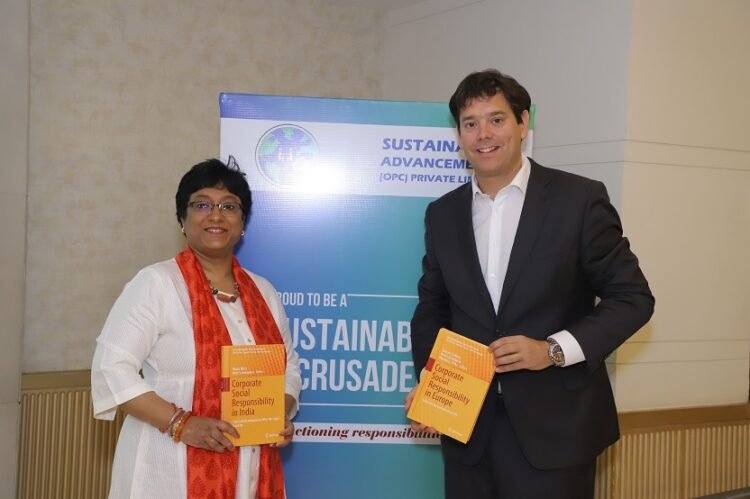Prof. Dr. Rene Schmidpeter, philosopher, business economist and holder of the Dr. Juergen Meyer Endowed Chair of International Business Ethics and Corporate Social Responsibility at CBS and founder of M3TRIX, Cologne, Germany and Dr. Nayan Mitra, Founder-Director of Sustainable Advancements (OPC) Private Limited, India talks about the effects of the COVID-19 virus on the broad economic dynamics of the world. Translated and facilitated by Khushboo Mehta, researcher, volunteer in the area of sustainability.
From the economic point of view, what is seen during the current corona crisis?
Schmidpeter: This crisis exposes relentlessly the reality of our global economic system in a state of ever-increasing crisis. In the times of digitalization and rapidly increasing environmental destruction, the need for fundamental structural changes has been apparent for some time. Thus, the corona crisis is a focal point identifying the weaknesses of our economic processes more effectively.
Mitra: Suddenly, the world has become one in all its suffering and challenges, the economies are collapsing both in developed and emerging economies, the supply chains are cut-off, human movement has been restricted and for once, the world over are thinking of localised self-reliance.
What are the weaknesses?
Schmidpeter: The international value chains are merely focused on reducing costs and are therefore especially vulnerable in crises. Over the past few years, the international financial system has relied on extremely low interest rates linked majorly to financial management growth.
Mitra: And, with the collapse of the market in certain non-essential commodities, the interest rate is expected to further deteriorate. The challenge now is not to make profit, but to sustain this trying time – live, learn and let go of the past way of life.
What is the outcome?
Schmidpeter: On the one hand, we have top global medical research in the triple-digit billion dollar range, while on the other hand the necessary resources (e.g. nursing staff) are not available in adequate numbers in hospitals and nursing homes. There is also a wide variety of medicines available with the same active ingredients. However, essential equipment such as protective equipment like protective gear and basic medicines are also missing in this crisis because value chains from China or India are disrupted. It also shows that before the crisis, many old industrial structures had already shown considerable signs of wear and tear and cannot be restored at all after the crisis.
Mitra: But, the good part is that, our weaknesses shows us our opportunities. If, we know that our weakness lies in production, which also means, we have huge potential in the manufacturing sector; on the other hand, if we know that our strength lies in manufacturing, we may think of substituting some of the things that we imported earlier. Infact, these are exciting times – so much of change occurring in every sphere. It’s like a sci-fi movie, when the world changed overnight.
What do you think of a change?
Schmidpeter: More than in a reconstruction phase, we are currently in a new entrepreneurial start-up time. And this will bring far-reaching innovations and regional adjustment effects. As a result, small-scale structures are increasingly becoming important. Also, the solidarity and cohesion in a region will be playing a decisive role for transforming our economic regions and also increasing the involvement of each and every individual.
Mitra: There will be transition, and like all transitions, the time will be especially challenging; but after the storm there will come a lull, when the changes settle down and the new normal becomes the way of the world. There will be more solidarity among people, more holistic ideas taking shape, social organisations rising out of the mayhem; micro, small, medium enterprises (MSME sector) taking precedence over large enterprises; start-ups taking a lead in innovations; survival of more flexible, agile organisations than old world thinking rigid edifices. It is indeed going to be a new world.
What does this mean for the Companies?
Schmidtpeter: This reflects a great potential in a regional value creation. This includes fewer external negative effects and at the same time a huge positive impact on the local communities. With this new approach, regional sustainable business models or circular economy models previously seemed expensive are becoming more profitable, if used in the right way. Especially many smaller, younger companies, start-ups offering new impact-oriented and regional business models are currently able to develop new market avenues. Thus, they are setting up innovative stimuli in their own regions.
Mitra: Could not agree more. Whatever we, the Sustainability crusaders have been advocating for years are now being implemented. We have research, documentation, case studies already done, they just need to be implemented on the ground right now. It is not only about companies thinking differently, but this COVID 19 has brought about drastic behaviour change among every individual. An extremely interesting read on this can be found in our forthcoming book, ‘Corporate Social Responsibility in Rising Economies’ by Springer International, Switzerland that not only details the fundamental perspectives of CSR in these emerging economies, but also provides inputs from 7 different countries. For more details, you may look into https://www.springer.com/gp/book/9783030537746 .



























